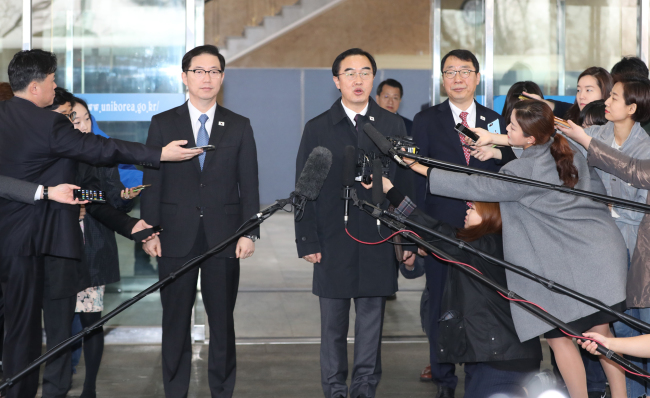PANMUNJOM -- South and North Korea kicked off their high-level talks Thursday to set the date and agenda for an inter-Korean summit slated for late April.
Top officials from both sides met at the Tongilgak building on the northern side of the border truce village Panmunjom, according to pool reports.
The meeting comes as South Korean President Moon Jae-in and North Korean leader Kim Jong-un plan to hold a summit in April at Panmunjom after more than a year of tensions sparked by the North's nuclear and missile programs.
Kim made a surprise visit to China earlier this week for his first talks with Chinese President Xi Jinping. The move came ahead of summits with Moon and US President Donald Trump in the coming months.
His trip to Beijing was seen as aimed at securing more bargaining chips ahead of his meeting with Trump, which will take place by May.
 |
This photo, taken March 29, 2018, shows Unification Minister Cho Myoung-gyon (C), South Korea`s chief delegate for the two Koreas` high-level talks, speaking to reporters before leaving for North Korea for talks. (Yonhap) |
For China, the summit highlighted Beijing's leverage over the North in resolving the North's nuclear standoff.
The two Koreas are likely to set the date for the summit during Thursday's talks, South Korea's presidential office Cheong Wa Dae said.
A presidential official said that both sides will likely discuss agenda items and working-level contacts needed to prepare for the summit.
The two Koreas candidly exchanged views, including on the summit date, in an amicable atmosphere, reflecting the recent rapprochement driven by the PyeongChang Winter Olympics.
"Over the past 80 days, there have been many dramatic events that have not been seen earlier," Ri Son-gwon, the North's chief delegate, said at the start of the meeting.
The upcoming inter-Korean summit will likely serve as a critical venue for discussions to resolve the North's nuclear issue.
The North's leader expressed his commitment to giving up nuclear weapons during his meeting with Xi, adding that its denuclearization hinges on Seoul and Washington taking "progressive and synchronous measures," according to China's Xinhua News Agency.
Trump agreed to meet with Kim after South Korean envoys who met with the North's leader in early March relayed Kim's expression of his commitment to denuclearization.
"The issue of (North Korea's) denuclearization has been the most important agenda item. ... That's the issue that we will focus on for discussion," Unification Minister Cho Myoung-gyon, the South's chief delegate for Thursday's talks, told reporters before leaving for Panmunjom.
North Korea's diplomatic outreach came after the country's advancement of its nuclear and missile programs heightened tensions last year, putting it under tougher international sanctions.
The North conducted its sixth and most powerful nuclear test in September last year. It also launched three intercontinental ballistic missiles last year, which analysts say are capable of reaching the US mainland.
Kim and Trump exchanged personal insults and bellicose rhetoric, raising fears about war on the divided peninsula.
But in a surprise move, the North extended a rare olive branch to Seoul in January, as Kim expressed his willingness to send athletes to the PyeongChang Winter Olympics held in the South last month.
The US is carrying out its campaign for "maximum pressure" to make the North abandon its nuclear arsenal and bring it to the negotiation table.
Trump announced the replacement of a lineup of the top diplomat and national security adviser with hardliners on North Korea ahead of his expected summit with Kim.
Washington has vowed to keep up its pressure campaign until the repressive regime takes sincere steps toward denuclearization. (Yonhap)






![[Out of the Shadows] Seoul room clubs offer drugs to compete for clientele](http://res.heraldm.com/phpwas/restmb_idxmake.php?idx=644&simg=/content/image/2024/11/05/20241105050566_0.jpg)

